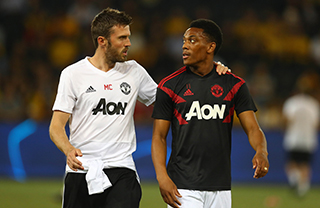
Michael Carrick: my approach to coaching elite players
- Jamie Griffiths
- 23 July 2020
Manchester United first-team coach, Michael Carrick, explains why understanding individuals, remaining calm and not always relying on what he did during his playing career are key to working with senior players at elite level.
Understand the individual
I think you've got to understand the individual player and find out what makes them tick. As the generations go by the characteristics of players change a little bit and the personalities change a little bit because the world does - socially that's just how it is. So, I think you really have to understand that and be able to deal with that.
I wouldn't say there is set way to coach. I think coaching is finding out about the individual and trying to get within a distance where there's still a barrier, but close enough to have their trust and respect.
Willingness to learn for players is key. So as the coach you need to be able to push the right buttons at the right time.
Don’t always do what you did as a player
Because I’ve gone through experiences as a player, it's easy to revert to what I was like in certain situations. However, that doesn't necessarily fit with the player that is in that situation now. So sometimes that first thought of “what did I do” or “what did the manager say to me” is not necessarily the right thing at that time. That's probably the biggest challenge that I’ve found, because certain individuals are different and the game has changed.

Judge how much information the players need
Me and Kieran McKenna [assistant first-team coach] alternate who does the first main meeting with the team before games, so it gives one of us a chance to look ahead at the next game. We're still heavily involved in all meetings, but one of us leads.
When we’re in and around the players there are lots of things to consider: do we give them information? Do we not? What's the balance like? Sometimes they don't need anything and other times we feel we need to give them a bit more depending on who we will play against.
Ole [Gunnar Solskjaer] asks for our opinion. On matchday, he gives us the licence to go on the touchline if we see something and say what we want. There's an awful lot of freedom there for us which is fantastic.

Matchday: stay calm and focus on detail
When my kids see me on the bench on matchday they say: “Dad, do you actually do anything? Because it looks like you're not doing anything”. But I'm quite calm, I’m not one that jumps about and gets too over excited, but inside I'm obviously desperate to win.
I played like that in some ways, where inside you have that stubbornness and a real drive, but on the outside it all seems quite calm and sometimes emotionless - until we score a goal or something that triggers me. Mostly I'm more focused on the details and putting the right things in place.
As a player, I didn't get so high or down so much, it was trying to keep level. I think that's important as a coach and as a manager to try and do that and to try and help the players be the same.
Clear observational focus
Spaces to attack is really my main focus when watching the games. Whether that’s looking at how to attack when the goalkeeper has got the ball, where the space is and how we can build-up through the pitch. It’s also about having an idea of how we can hurt the opposition from all areas of the pitch. That’s my first thought really, my instinct takes me to that. Within that there is observing the general game: how the opposition set up and what their strengths are.

Learn from others, but be yourself
I think all the managers and coaches that I’ve worked with have had an impact and in different ways. Obviously, Sir Alex Ferguson, you don't need me to speak too much about him, he's the best around. Louis van Gaal was fantastic technically and tactically. How he saw the game was very different to Sir Alex, so I learned an awful lot from him.
Being close to Jose Mourinho - that was my first experience of coaching and seeing how he works, how he sees the game. It makes you realise that's three of the top managers and coaches of all time and they had very different views on certain situations.
It has definitely had an influence on me, but I think you are what you are. I'm not sure you choose. Your instincts tell you what you like and what you don't like, then you learn and try and figure it out from there and make the best of it.
Article image courtesy of Kieran McManus/BPI/REX.


